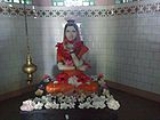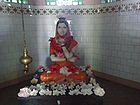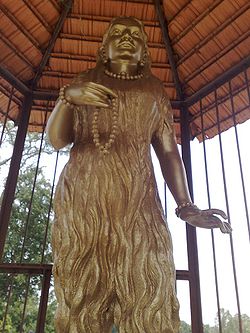
Akka Mahadevi
Encyclopedia



Bhakti
In Hinduism Bhakti is religious devotion in the form of active involvement of a devotee in worship of the divine.Within monotheistic Hinduism, it is the love felt by the worshipper towards the personal God, a concept expressed in Hindu theology as Svayam Bhagavan.Bhakti can be used of either...
movement of the 12th century Karnataka
Karnataka
Karnataka , the land of the Kannadigas, is a state in South West India. It was created on 1 November 1956, with the passing of the States Reorganisation Act and this day is annually celebrated as Karnataka Rajyotsava...
. Her Vachanas in Kannada, a form of didactic poetry are considered her greatest contribution to Kannada Bhakti literature. In all she wrote about 430 Vachanas which is relatively fewer than that compared to some other saints of her time. Yet the term 'Akka' (elder Sister) which is an honorific given to her by great Veerashaiva saints like Basavanna, Chenna Basavanna, Kinnari Bommayya, Siddharama, Allamaprabhu and Dasimayya speaks volumes of her contribution to the movement under that was underway. She is in hindsight seen as a great and inspirational woman for Kannada literature
Kannada literature
Kannada literature is the corpus of written forms of the Kannada language, a member of the Dravidian family spoken mainly in the Indian state of Karnataka and written in the Kannada script....
and the history of Karnataka. She is said to have accepted the god Shiva
Shiva
Shiva is a major Hindu deity, and is the destroyer god or transformer among the Trimurti, the Hindu Trinity of the primary aspects of the divine. God Shiva is a yogi who has notice of everything that happens in the world and is the main aspect of life. Yet one with great power lives a life of a...
('Chenna Mallikarjuna') as her husband, traditionally understood as the 'madhura bhava' or 'madhurya' form of devotion (similar to how centuries later Meera, a 16th century saint, considered herself married to Krishna
Krishna
Krishna is a central figure of Hinduism and is traditionally attributed the authorship of the Bhagavad Gita. He is the supreme Being and considered in some monotheistic traditions as an Avatar of Vishnu...
).
Early life
Born in Udutadi (or Udugani) near the ancient city of BanavasiBanavasi
Banavasi is an ancient temple town in Uttara Kannada District bordering Shivamogga district in the South Indian state of Karnataka .-History:Banavasi is one of the oldest towns in the Karnataka state...
(in Shikaripura taluk Shimoga district
Shimoga District
Shimoga District is a district in the Karnataka state of India. A major part of Shimoga District lies in the Malnad region of the Western Ghats, a hilly area known for its green forests, plentiful rainfall, and as the source of many of the area's rivers. Shimoga City is the administrative centre...
). She was born in 1130CE and lived until 1160. She worked for the welfare of women.
Mythology
She is a prominent figure in the field of female emancipation and a person of mystical vision. A household name in Karnataka, she had said that she was a woman only in name and that her mind, body and soul belonged to Lord Shiva. During a time of strife and political uncertainty in the 12th. century, she launched a movement that made her an inspiration for woman empowerment and enlightenment. It is commonly known that she took part in many gatherings of learned at the Anubhavamantapa in Kudala sangama to debate about philosophy and attainment of enlightenment (or Moksha, termed by her as "arivu"). In search for her eternal soul mate, she made the animals, flowers and birds her friends and companions, rejecting family life and worldly attachment.The time was marked as height of foolishness of varnashrama dharma which only supported the three upper castes of Hindu society in India and suppressed the shudras and women.
Akka was a revelation here in that she not only rose for emancipation but also has sung vachanas which are so simple but of highest order.
It is said that Mahadevi was married by arrangement to Kausika but later did not as the king disrespected some conditions set by her. There were immediate tensions, however, as Kausika was a Jain, a group that tended to be wealthy and was, as a result, much resented by the rest of the population. Akka's poetry explores the themes of rejecting mortal love in favor of the everlasting love of God. Her vachanas also talk about the methods that the path of enlightenment demand of the seeker, such as killing the 'I', conquering desires and the senses and so on.
She rejected her life of luxury to live as a wandering poet-saint, traveling throughout the region and singing praises to her Lord Shiva.
She went in search of fellow seekers or sharanas because the company of the saintly or sajjana sanga is believed to hasten learning. She found the company of such sharanas in Basavakalyana, Bidar district
Bidar District
Bidar is a district of Karnataka state in southern India. The historic city of Bidar is the administrative centre of the district. The district is located in the northeastern corner of the state, near the borders with Andhra Pradesh to the east and Maharashtra to the north and west...
. Akka utters many vachanas in praise of them. Her non-conformist ways caused a lot of consternation in a conservative society and even her eventual guru Allama Prabhu had to initially face difficulties in enlisting her in the gatherings at Anubhavamantapa. A true ascetic, Mahadevi is said to have refused to wear any clothing—a common practice among male ascetics, but shocking for a woman. Legend has it that due to her true love and devotion with God her whole body was protected by hair.
All the sharnas of Anubhavamantapa, especially Basavanna, Chenna Basavanna, Kinnari Bommayya, Siddharama, Allamaprabhu and Dasimayya greet her with a word “Akka”. In fact it is here onwards that she becomes Akka, an elderly sister. Allama shows her the further way of attaining the transcendent bliss of ultimate union with Lord Chenna Mallikarjuna. Akka leaves Kalyana with this fallowing vachana:
“Having vanquished the six passions and become
The trinity of body, thought and speech;
Having ended the trinity and become twain - I and the Absolute
Having ended the duality and become a unity
Is because of the grace of you all.
I salute Basavanna and all assembled here
Blessed was I by Allama my Master-
Bless me all that I may join my Chenna Mallikarjuna
Good-bye! Good-bye!”
This dramatic situation of Kalyana Parva in Akka Mahadevi’s life is an indication of the beginning of the third phase of her life. In the first phase she had renounced the worldly objects and attractions and in the second, discards the entire object based rules and regulations and in the third phase she starts her journey towards Srishila, where her eternal lover Chenna Mallikarjuna’s temple locates. Also it is the holy place of the Shiva cult since before the 12th century. Akka’s spiritual journey ends at Kadali the nearby thick forest area of Shrisaila (Srisailam) where she is supposed to have experienced union (aikya) with Chennamallikarjuna.
One of her famous vachana translates as
People,
male and female,
blush when a cloth covering their shame
comes loose
When the lord of lives
lives drowned without a face
in the world, how can you be modest?
When all the world is the eye of the lord,
onlooking everywhere, what can you
cover and conceal?
Her poetry exhibits her love for Chenna Mallikarjuna and harmony with nature and simple living.
She Sang:
For hunger, there is the village rice in the begging bowl,
For thirst, there are tanks and streams and wells
For sleep temple ruins do well
For the company of the soul I have you, Chenna Mallikarjuna
Recent work on the period suggests that understanding Akka Mahadevi as an inspiration for 'women's empowerment' is a deeply anachronistic reading. Such readings it is argued were products of the colonial schemes of interpretation that initially took great interest in Virasaivism, for its declarations about Shiva as the Supreme God. These fervent declarations of love and devotion were taken to be philosophical arguments for Monotheism by the British (Orientalist) historians.
It was A K Ramanujan who first popularized the vachanas by translating them into a collection called Speaking of Siva. But his translations render the vachanas into modern universalist poetry ready-to-consume by the west. This is critiques by postcolonial scholar Tejaswini Niranjana in Siting Translation (1992).
External links
http://www.madhusreedutta.com/film3.htm

